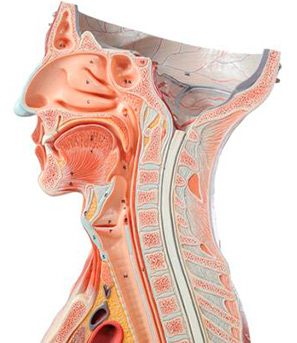Advanced & Affordable ENT Treatment in India
ENT Anatomy and Function
The ears, nose and throat are important parts of our body that are used on a daily basis. The ears are sensory organs that are not only related to hearing, but also function to provide us with a sense of balance.
The nose being another sensory organ not only provides us with sense of smell, but also partially provides us with sense of taste. It also plays an important function in humidifying air we breathe and works to prevent germs from entering the body.
The throat mainly functions as a pathway through which food and fluids travel to the esophagus and air passes to the lungs.
Dysfunction of the ears, nose or throat can dramatically affect quality of life whereas in some cases it may constitute a medical emergency. If one has chronic ear, nose, or throat problems, it is advisable to not only see a primary care physician, but to also include an otolaryngologist in the management of the disorder. ENT doctors are also called otolaryngologists. An otolaryngologist is trained both in surgery and medicine.

Below are some of the most common signs and symptoms experienced by ENT patients:-

The most common ENT disorders are classified as below : –
Treatment for ENT Disorders
The best treatment will vary according to what type of problems or symptoms one is having. Treatment may begin with medication and lifestyle modifications. But in some cases one may needs surgery as well.
Cost Estimate
Cost of treatment for ENT disorder varies depending on the condition as some cases require only medical management and some cases may require surgical intervention.
Frequently Asked Questions and patient concerns:
1. What is the treatment for an ear infection?
In around a week the majority of ear infections will run their course. With over-the-counter drugs, eardrops, and hot compresses, pain can be dealt with. Antibiotics are recommended if the cause is a bacterial infection. Ear tubes may help children who suffer chronic ear infections.
2. I experience frequent sinus infections. Is this normal?
The type of treatment for spinal tumors depends on whether and where they are found in the spinal cord and whether they are malignant or benign. In certain cases, only oral medication can be needed to reduce spinal development. However, if the tumors do not respond to conservative treatment steps, spine experts can determine that the next choice for surgery is to maintain function in the affected areas and prevent further growth of the tumor.
3. Is sinus surgery necessary?
Sinus surgery can be performed when sinusitis complications have occurred. The first step is to have it tested by a primary physician once sinusitis is diagnosed. If the inflammation hasn’t decreased within 3 months, it is called chronic sinusitis. The ENT doctor can prescribe surgery in the sinus region for chronic sinusitis. Therefore, in all cases, sinus surgery is not mandatory unless the matter is critical.
4. Can the ENT surgeries affect voice?
There are operations carried out that have an unexpected impact on the voice. Almost all surgical interventions could have a direct or indirect effect on the voice. Thus, before performing any surgical procedure, it is important to consider voice-related side effects. Sinusitis, thyroid surgery and cervical spine surgery are several procedures that could possibly affect the voice.
5. What is balloon sinuplasty?
Balloon sinuplasty is a technique used in selected patients to widen blocked openings of the sinus cavities of a patient (usually caused by allergy-related swelling, inflammation, etc.) so that the sinuses could drain.
6. What other conditions cause nasal obstruction?
Nasal obstruction can result from a deviated septum, nasal turbinate enlargement, adenoid enlargement or nasal polyps, in addition to sinusitis. When indicated, surgical alternatives are available for these conditions.
7. What causes hoarseness, and should I be concerned?
Hoarseness is the consequence of laryngeal discomfort (voice box). Upper respiratory infection, gastroesophageal reflux disease (GERD) and postnasal drip are the most common causes. If the condition lasts more than four to six weeks, see a doctor to rule out something more severe, such as nodules, tumors or vocal cord paralysis.
8. What are the signs of hearing loss?
Hearing loss symptoms include trouble recognizing what others say, asking others to repeat themselves, failing to hear in disruptive background noise in crowded areas, perceiving that others are murmuring or not speaking clearly, listening to a higher volume of television or radio than others and hearing a ringing or humming in the ears.
9. Can ENT doctors diagnose and treat throat cancer?
Yes. ENT doctors, in fact, are the physicians who do just that. A consultation with an ENT doctor may take place at any time when there is fear that anyone might have throat cancer. Almost all cases of throat cancer can actually be identified by the test that ENT doctors conduct. Other tests, such as CT or MRI, are also often needed. In order to make the final cancer diagnosis, a biopsy (small sample) will then be carried out. A recovery plan can be decided after that. Surgery, radiation therapy and/or chemotherapy can be part of this. Radiation therapy and chemotherapy, as used, are performed by radiation and medical oncologists called other cancer specialists. This provides an ENT expert care team plus the required oncologist for a patient with cancer of the throat.

MedicoExperts is a Global virtual hospital which is established to offer quality healthcare services at affordable pricing without compromising the success rates of the treatment.
MedicoExperts is having a network of highly experienced super specialist doctors and well equipped hospitals across the globe and offering second opinion through online video consultation and surgical interventions through its empanelled super specialist doctors at its network hospitals in 17 countries from 3 continents.
By the virtue of its approach and model, MedicoExperts is successfully achieve to deliver
- Latest and most advanced treatments with success rates of international benchmarks.
- Multiple cost options depending upon the hospital facilities, with the same doctor.
- Treatment option in multiple cities/state/countries.
- Trust and peace of mind.
Most suitable for patients who are looking for:-
- Planned Surgeries and treatment from most experienced doctors and at multiple cost options as per hospital facilities with best possible outcomes.
- Second Opinion from expert doctors.
- Complex cases involving multi specialities
- International patients looking for treatment from Indian doctors

Author Bio:
Dr. Ashita Nandgaonkar – BHMS, MS in psychological counseling
Dr. Ashita Nandgaonkar is a highly esteemed homeopathic doctor with a passion for holistic healing and patient-centered care. Dr. Nandgaonkar remains dedicated to raising awareness about the benefits of homeopathy and promoting its integration into mainstream healthcare. Her mission is to empower individuals on their journey to health and wellness, embracing the holistic approach that homeopathy offers. She has a special interest in researching Homeopathic solutions for diseases that are difficult to treat with conventional medicines and therapies.
Content Medically Reviewed By MedicoExperts Editorial & Clinically Review Board






















